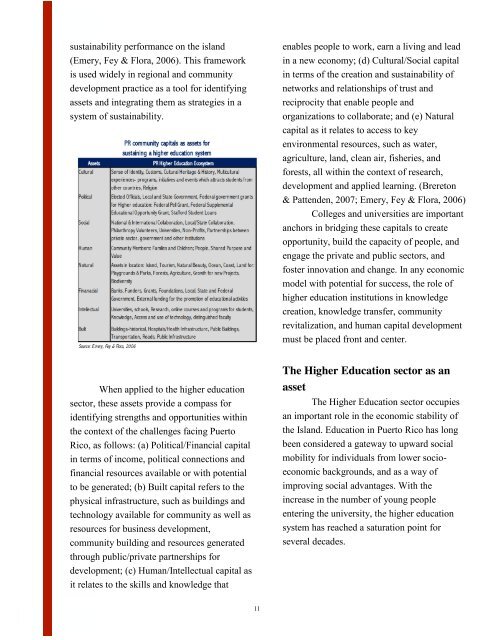CLC-Conference-Proceeding-2018
You also want an ePaper? Increase the reach of your titles
YUMPU automatically turns print PDFs into web optimized ePapers that Google loves.
sustainability performance on the island<br />
(Emery, Fey & Flora, 2006). This framework<br />
is used widely in regional and community<br />
development practice as a tool for identifying<br />
assets and integrating them as strategies in a<br />
system of sustainability.<br />
enables people to work, earn a living and lead<br />
in a new economy; (d) Cultural/Social capital<br />
in terms of the creation and sustainability of<br />
networks and relationships of trust and<br />
reciprocity that enable people and<br />
organizations to collaborate; and (e) Natural<br />
capital as it relates to access to key<br />
environmental resources, such as water,<br />
agriculture, land, clean air, fisheries, and<br />
forests, all within the context of research,<br />
development and applied learning. (Brereton<br />
& Pattenden, 2007; Emery, Fey & Flora, 2006)<br />
Colleges and universities are important<br />
anchors in bridging these capitals to create<br />
opportunity, build the capacity of people, and<br />
engage the private and public sectors, and<br />
foster innovation and change. In any economic<br />
model with potential for success, the role of<br />
higher education institutions in knowledge<br />
creation, knowledge transfer, community<br />
revitalization, and human capital development<br />
must be placed front and center.<br />
When applied to the higher education<br />
sector, these assets provide a compass for<br />
identifying strengths and opportunities within<br />
the context of the challenges facing Puerto<br />
Rico, as follows: (a) Political/Financial capital<br />
in terms of income, political connections and<br />
financial resources available or with potential<br />
to be generated; (b) Built capital refers to the<br />
physical infrastructure, such as buildings and<br />
technology available for community as well as<br />
resources for business development,<br />
community building and resources generated<br />
through public/private partnerships for<br />
development; (c) Human/Intellectual capital as<br />
it relates to the skills and knowledge that<br />
The Higher Education sector as an<br />
asset<br />
The Higher Education sector occupies<br />
an important role in the economic stability of<br />
the Island. Education in Puerto Rico has long<br />
been considered a gateway to upward social<br />
mobility for individuals from lower socioeconomic<br />
backgrounds, and as a way of<br />
improving social advantages. With the<br />
increase in the number of young people<br />
entering the university, the higher education<br />
system has reached a saturation point for<br />
several decades.



